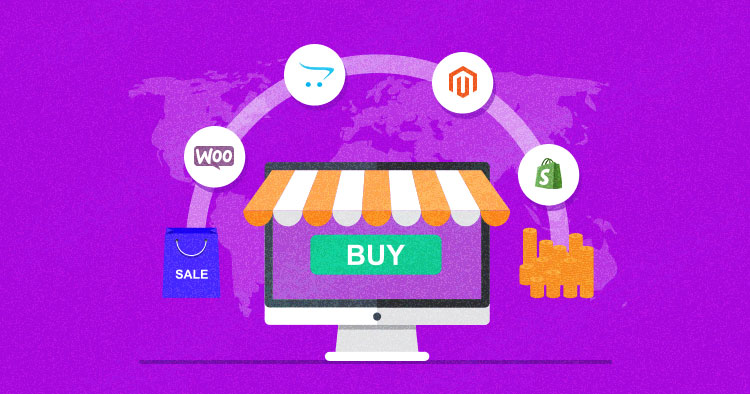
The global ecommerce sales totalled to approximately 4.9 trillion U.S. dollars in 2021. This is projected to grow by 50% over the span of the next four years. According to Statista, this figure will balloon to to 7.4 trillion dollars by 2025.
Moreover, if we talk about the global e-commerce market, it is to grow at a compound annual growth rate of 14.7% from 2020 to 2027 to grow to $27,147.9 billion by 2027.
Take a look at this graph that illustrates the global market share of each ecommerce platform as of July 2022.
 Source: Statista
Source: Statista
According to Statista, the global market share of WooCommerce is the second largest, mainly because it’s so flexible and open-source. Oh, and did you know it’s free? If you are using WordPress, WooCommerce is a great choice. However, it’s not the player in town. There are several others too. Here’s our detailed comparison of the top ecommerce platforms and why we think WooCommerce might just be the best.
Market Share of Top Ecommerce Platforms in 2024
Now, there are several ecommerce platforms, and if you are interested in launching your own store, it’s important to choose the right one. Let’s analyze some of the most popular platforms and see how they have evolved over the years.
The graph below illustrates the top ecommerce platforms’ usage in the top 1 million sites in 2024.
 Source: BuiltWith
Source: BuiltWith
As you can see, WooCommerce Checkout and Shopify own a majority of the share when it comes to ecommerce platforms used by the top 1 million sites. Previously, Magento used to dominate the market. However, currently, it owns almost 7% of the global ecommerce market.
The entire ecommerce industry has grown dramatically over the years, and as a result, adoption rates for different platforms have also increased.
For instance, in 2018, WooCommerce Checkout’s market share was around 21%. And now it stands at 23% in 202$.
On the other hand, Shopify stands second at 20% in the top 1 million sites with a global market share of 11%, while WooCommerce commands 23%.
The surprising change is with Magento, which has fallen from 13% in 2018 to 7% in 2024, primarily due to the increased complexity and availability of simpler platforms.
The rest of the industry is dominated by platforms like BigCommerce, SquareSpace, OpenCart, Ecwid, and others.
Load Your Ecommerce Store Under 1 Second
Google loves websites that load in a SINGLE second. Our optimized ecommerce hosting stack lets you do that.
Reviewing the Top Ecommerce Platforms
Choosing one can get a bit overwhelming for an entrepreneur. In this article, we shall be covering WooCommerce, BigCommerce, Magento, Shopify, 3DCart, Squarespace, Zyro, Square Online, OpenCart, Yo!Kart, Volusion, Ecwid, and Salesforce Commerce Cloud.
1. WooCommerce

WooCommerce consistently ranks among the top-rated ecommerce platforms, with an ever-increasing adoption rate. The company regularly introduces and updates new features as well.
One reason for WooCommerce’s popularity is the fact that it is a simple, free-to-use plugin for WordPress – the most popular CMS in the digital world today. Plus, the WooCommerce platform allows you to scale your ecommerce store effectively with little to no trouble at all.
WooCommerce hosting is also readily available to improve your store performance. Use our Free Pricing Calculator tool to determine web hosting cost.
Cloudways also offers the WooCommerce Starter Bundle. Instead of integrating plugins one by one, the WooCommerce Starter Bundle gives you 1-click integration for some of the most popular plugins, including:
- Kadence Email Designer
- Stripe Gateway
- Paypal Checkout
- Checkout Field Editor
- Coupon Shortcodes
- Shipping & Tax
- Google Analytics
- Cart Abandonment Recovery
It’s the ultimate solution for people who want to launch their stores quickly and efficiently using WooCommerce. WooCommerce is also great, considering the flexibility it offers for your ecommerce product page SEO.
Launch Your Ecommerce Store Today!
Choose the Cloudways Ecommerce Starter Bundle powered by WooCommerce. Avoid the early struggles, and start selling immediately with just a few clicks and pre-installed plugins!
2. BigCommerce

BigCommerce is a popular software-as-a-service ecommerce platform that enables merchants to build, innovate and grow their businesses online. Founded in 2009 and now powering over 600,000 stores in 150+ countries, they have become a major player in the ecommerce industry and continue to gain traction. Some notable customers include Ben & Jerry’s, Molton Brown, S.C. Johnson, Skullcandy, Sony, Vodafone, and Woolrich.
With integrations like Amazon, Google, Walmart, and more, BigCommerce is a good choice where you can easily create and manage your online store, and it also includes features like ecommerce web host, security, and payment processing. Their platform is designed for scalability, making it a great option for businesses of all sizes.
While major players like Magento and Shopify have yet to cede ground, BigCommerce is doing everything it can to catch up. Their aggressive acquisition strategy has allowed them to strategically challenge the global competition and outgrow themselves as an emerging ecommerce platform.
3. Magento

Magento’s ecommerce platform had the 2nd largest market share in 2017, with nine percent of the global ecommerce market share. However, in 2018, the tables turned when it lost its dominance to Shopify. That gap continues to grow as Shopify has more than twice the adoption rate as Magento in 2024.
Many Magento users switched to Shopify for easier functionality. However, Magento offers customization that Shopify is unable to provide, which is why it’s been able to hold on to its technically proficient customer base.
Magento ecommerce comes with a number of tools for analytics, monitoring, and conversion optimization. Magento supports both OOP and MVC architecture, which is a great deal for web developers but not so much for the not-so-tech-savvy. It might be a challenge for users who do not have the sharp technical skills required to modify Magento and scale their ecommerce stores effectively. But if you do have the technical expertise, Magento can prove to be an amazing online store platform for your business.
4. Shopify

Shopify is the third-largest ecommerce website platform in 2024. It promoted itself to the second spot in 2018 and has continued to maintain its dominance.
The majority of ecommerce entrepreneurs are opting for Shopify simply because of its user-friendly interface. The integration of Amazon services has also allowed Shopify to greatly improve its market share. With an array of Shopify resources available online, it is one of the best ecommerce marketing platforms for your products and services.
It is, however, a self-hosted platform. As a result, many people who want greater freedom look for Shopify alternatives.
5. Shift4Shop
 Formerly 3dCart, shift4Shop is a great ecommerce platform overall, however, it still needs to evolve immensely. It might not be a great choice for you if you have heavy traffic coming in on your online store.
Formerly 3dCart, shift4Shop is a great ecommerce platform overall, however, it still needs to evolve immensely. It might not be a great choice for you if you have heavy traffic coming in on your online store.
The reason why we have included it in our list is that it stands out from other ecommerce stores in terms of SEO with features that go beyond breadcrumb links and canonical URLs. This is why in the near future, we expect it to make a place for itself in the global competition.
6. SquareSpace

SquareSpace has become incredibly popular in the past couple of years.
Squarespace gives you everything that you need to start a store, including a range of themes, customizable features, and a lot more. However, there are a few constraints that keep it from being accessible to large store owners.
For example, Squarespace has limited customization features. Plus, since it’s a hosted platform, you may have a hard time choosing a better host.
7. Zyro

Zyro is another drag-and-drop builder with a host of AI tools and even a logo-maker.
It has everything that you want to get your store off the ground, including a ecommerce website hosting. There’s a free version as well. However, you can’t switch templates, and the free accounts are quite limited in terms of functionality.
Oh, and you can’t schedule blog posts. But if you need a simple barebones ecommerce website builder, this is the way to go.
8. Square Online

Known as Weebly before its acquisition by Square, Square Online offers excellent value for money, as well as good design flexibility.
Weebly still exists, and it’s ideal for smaller businesses. However, if you are running a larger ecommerce store, Square Online might be what you need.
It’s got all the necessary features, including in-built marketing tools, and a dashboard that presents all the information you need at a glance.
9. OpenCart

OpenCart has lots of customizable options, and there’s no monthly subscription fee. You also get multi-store support that allows you to manage multiple stores from a single platform.
It’s also got a range of flexible attributes and options; with more than 1,300 modules and themes available, it’s a great choice if you want to create custom stores.
10. Yo!Kart

Yo!Kart is a self-hosted & scalable multi-vendor ecommerce platform for building future-proof online marketplaces similar to Amazon, eBay, and Etsy. The platform has diverse in-built features such as catalog management, multi-lingual, multiple payment gateways, BOPIS, ready mobile apps, & several pre-integrated APIs.
Unlike other ecommerce platforms like Shopify or Bigcommerce, it enables startups, SMBs & enterprises to launch their digital marketplaces without any external plugin or app. Also, Yo!Kart comes with a lifetime license and one-time pricing model making it a cost-efficient online marketplace software.
11. Volusion

Volusion is a hosted platform, with prices starting from $29 and going all the way to $299, which is the same range as Shopify and BigCOmmerce.
It’s affordable, and it also gives you access to more than 30 payment gateways. Plus, the platform doesn’t charge any transaction fee. And it’s got a fairly intuitive website builder as well.
12. Ecwid

“Like Shopify, but free” – that’s how Ecwid markets itself. Ecwid is a SaaS tool that requires a subscription. The company continues to add new options for store creation.
But it’s different from BigCommerce and Shopify in the sense that it would be harder to create a standalone store with it.
Instead, you can use Ecwid to add an additional store to your current online presence.
13. Salesforce Commerce Cloud

Salesforce is already a big name. You can create a range of different kinds of cloud-based ecommerce stores using Salesforce Commerce Cloud, which gives you customizable features for sales, marketing, order fulfillment, feedback, and a lot more.
Top Ecommerce Platforms by Region – Updated as of 2024
It’s time to highlight the ecommerce platform market share by different regions alongside the global market share. The numbers are promising. Here is the breakdown of the major regions:
i. The United States
 The US Ecommerce Platforms Market Share – BuiltWith
The US Ecommerce Platforms Market Share – BuiltWith
An interesting varity of ecommerce platforms are used in the USA. Leading names include Shopify (25% market share), Wix Stores (24% market share), WooCommerce Checkout (18% market share), and Squarespace Add to Cart (11% market share).
On the other hand, smaller market leaders include Ecwid (4% market share), and others like Weebly, ZenCart, PrestaShop, and Magento totaling 18% of the total U.S. ecommerce usage distribution.
Among these regional leaders, Wix, Weebly, and Shopify use the website builder module that makes it easy for users to set up and launch ecommerce stores.
In contrast, Magento, OpenCart, Prestashop, and Zencart are custom ecommerce platforms that allow store owners to fully customize their store as per their will.
ii. The United Kingdom
 The United Kingdom Ecommerce Platforms Market Share – BuiltWith
The United Kingdom Ecommerce Platforms Market Share – BuiltWith
The top five ecommerce platforms with respect to market share from the UK include: Wix Stores (26%), WooCommerce (21%), Shopify (18%), Ecwid (10%), and SquareSpace Add to Cart (10%). Other ecommerce platforms like Magento Ecommerce, OsCommerce, and Weebly stand at 17% among the top five ecommerce platforms in the UK.
The 2024 global ecommerce platform market share by BuiltWith clearly shows us how ecommerce entrepreneurs are drifting towards an easy-to-use interface instead of taking complete control over the design and functionality of their store.
iii. Australia
 Australia Ecommerce Platform Market Share – BuiltWith
Australia Ecommerce Platform Market Share – BuiltWith
In Australia, the top five leading ecommerce platforms that lead the market share statistics, include Shopify (25%), WooCommerce (21%), Wix Stores (19%), Squarespace (14%), and Ecwid (5%). These are closely followed by other ecommerce platforms like OpenCart, Weebly, Magento, and others (9%).
iv. Germany
 Germany Ecommerce Platforms Market Share – Builtwith
Germany Ecommerce Platforms Market Share – Builtwith
That’s a colorful pie, isn’t it? That’s because the Germans prefer to use a variety of ecommerce platforms. Interestingly, unlike the USA, the UK, or Australia, Germany’s leading market share belongs to Ecwid (19%) and not to others such as WooCommerce or Shopify.
Shopify’s market share stands at 20%, Wix Stores 19%, while WooCommerce Checkout holds an 11% market share, followed by Shopware(6%), ePages (3%), and others hold a market share of 20 percent.
It looks like the Germans tend to opt for higher functionality instead of a user-friendly interface considering they chose Ecwid for its SEO. As a matter of fact, I also strongly believe that an easy-to-use interface is not the key to scale your ecommerce stores effectively. You need a custom ecommerce platform with appropriate analytical tools in order to outgrow the potential of your ecommerce business.
v. Russia
 Russia Ecommerce Platforms Market Share – BuiltWith
Russia Ecommerce Platforms Market Share – BuiltWith
In the Russian market, WooCommerce Checkout dominates with a massive 35% market share. OpenCart lies in second place with 26% market share. Ecommerce platforms like Wix Stores (12%), VirtueMart (4%), JoomShopping (3%), InSales (4%), and others (16%).
Before we jump to the conclusion of this article, there is one more thing you need to know, in order to understand the market share of the top-performing ecommerce platforms. BuiltWith has provided a detailed analysis that represents the ecommerce platform market share based on the ENTIRE INTERNET and not just the top one million websites.
 Ecommerce Platform Market Share Based on the Entire Internet – BuiltWith
Ecommerce Platform Market Share Based on the Entire Internet – BuiltWith
According to the illustration above, Shopify’s market share is the highest with 27% of the entire World Wide Web. WooCommerce Checkout comes second with 24%, and Wix Stores with 11% market share. These three are the most popular ecommerce platforms of netizens from across the globe. These statistics represent how netizens tend to prefer ease and comfort over functionality and customization.
Which One Should You Choose?
It’s obviously difficult to make a selection with so many options available. You could go with WooCommerce if you have a WordPress website. If you want a hosted platform, Shopify might be your best bet. Or, if you want something that is quite advanced in functionality, fully customizable, and open source, you can go with Magento.
Regardless of the platform you choose, it’s important to do your research carefully. Most importantly, define your ecommerce website goals (size, revenue, growth plans), know what exactly you’re looking for (easy to use interface, high functionality, etc.), and read up on the features of each ecommerce platform in detail before you make the final choice.
Sajjad Shahid
Sajjad is an Ecommerce Community Manager at Cloudways. He loves helping out Ecommerce store owners, merchants and marketers in establishing their businesses and startups. Sajjad enjoys playing table tennis and cricket over the weekend.

